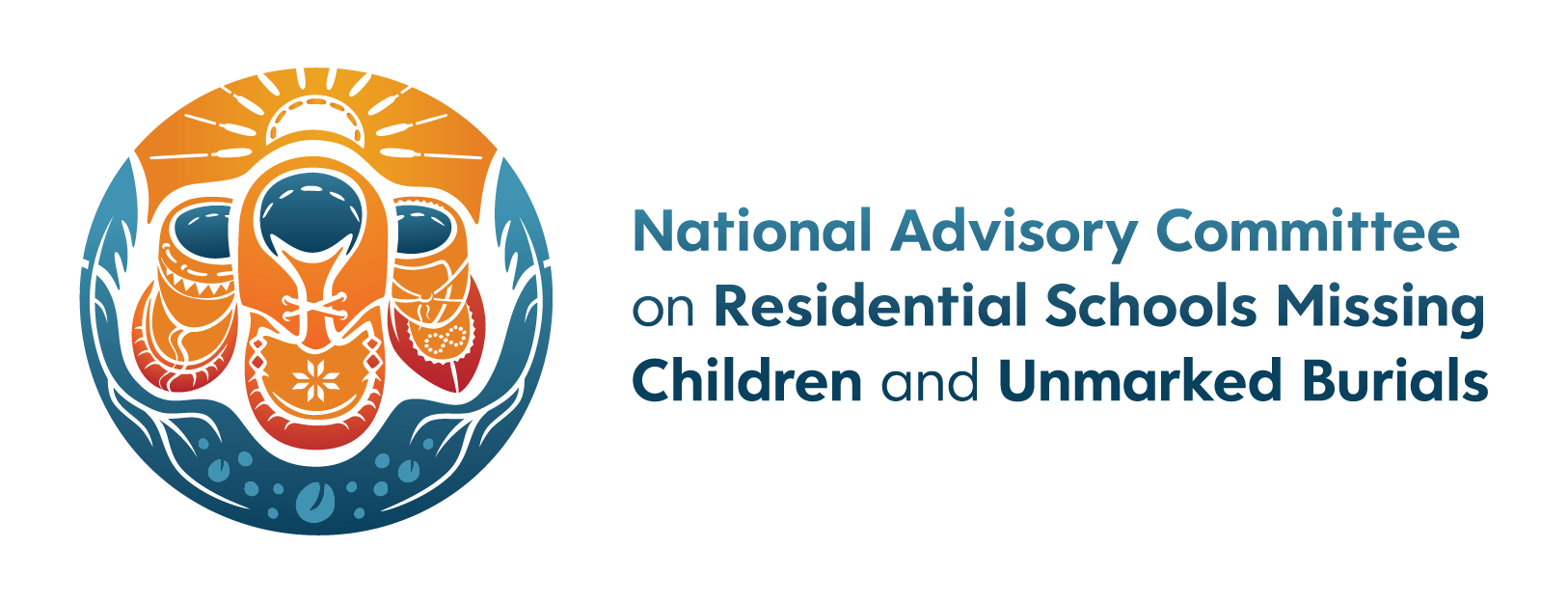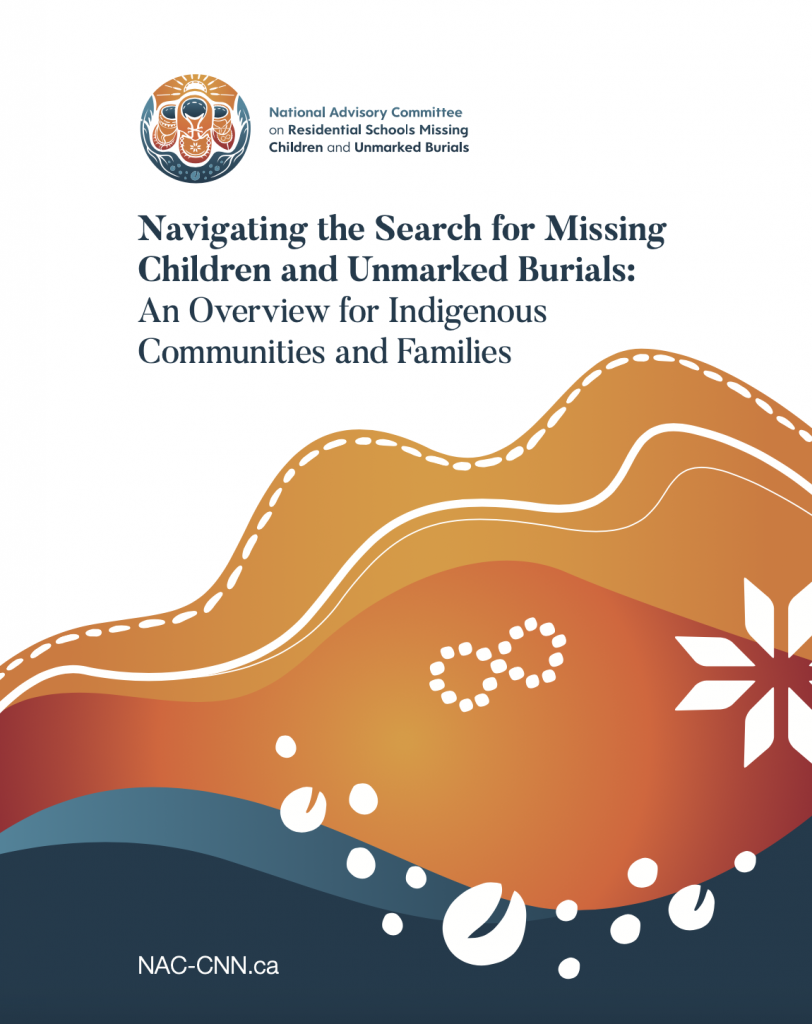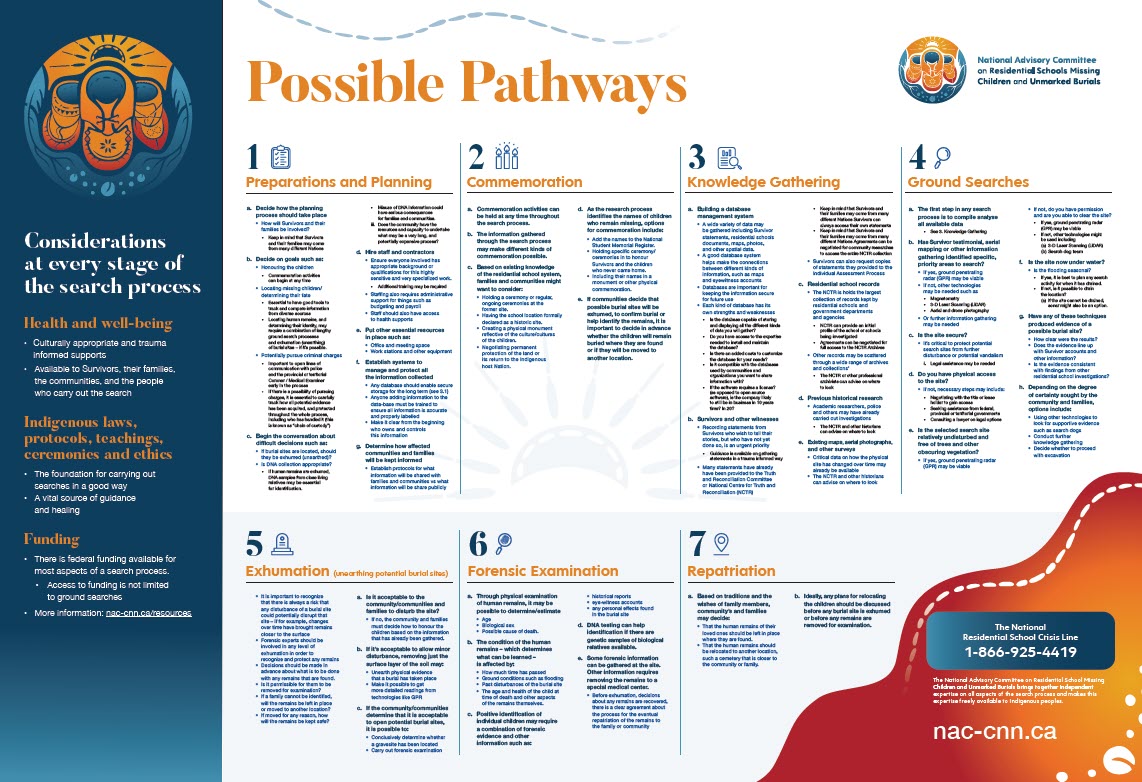Content warning: The content on this page deals with residential and boarding schools, the death and disappearance of children, child abuse, genocide, and intergenerational trauma. The National Residential School Crisis Line is available at all times, free of charge: 1-866-925-4419. Free support is also available through the Hope for Wellness chatline at 1-800-721-0066 or using the chat box at https://www.hopeforwellness.ca/.
This resource list will be regularly updated and expanded. To recommend additions to this resource list, please contact.
Content on this page is divided into the following categories:
OVERVIEWS
National Advisory Committee on Residential School Missing Children and Unmarked Burials
Navigating the Search for Missing Children and Unmarked Burials: An Overview for Indigenous Communities and Families
A short, accessible summary explaining the possible components of a search process and key considerations in developing a search plan.
Frequently Asked Questions About the Search for Residential School Missing Children and Unmarked Burials
Brief responses to some of the questions we have heard most often from communities considering undertaking a search.
Canadian Archaeological Association
Recommended Pathway for Locating Unmarked Graves Around Residential Schools
This short document provides an accessible, expert introduction to the following topics:
- Community-based Work
- Survivor Wellbeing Supports
- Archival Research
- Community/Survivor Knowledge
- Database Development
- Area Mapping
- Subsurface Remote Sensing Fieldwork
- Communication of Results
- Memorialization
- Possible Excavation and Forensic Work
Canadian Anthropological Association Working Group on Unmarked Graves
Searching For Missing Children: A Guide to Unmarked Graves Investigations
January 2023
Institute for Prairie and Indigenous Archaeology
Community Resources Guide for Unmarked Graves Research
A short introductory guide that sets out key factors to consider when starting a search process, including a recommended workflow. The primary focus is on the prairie region.
Canadian Anthropological Association
Webinar: Finding the Relatives: Wise Practices for Research Design in Western Canada
Features National Advisory Committee member Kisha Supernant along with William Wadsworth and Terry Clark
Length 26:48
Government of Alberta
Resource Guide for Researching and Recognizing Residential School
Provides links for provincial residential school records, resources related to heritage designation and other ways to protect sites, and provincial funding sources.
British Columbia Technical Working Group on Missing Children and Unmarked Burials
Draft summary of acronyms for communities.
This one-page introduction explains some of acronyms like GPR (ground penetrating radar) that you are most likely to encounter when learning about the search process. It is part of a series of short articles prepared by the BC Technical Working Group which are linked elsewhere in this resource guide.
Office of the Independent Special Interlocutor for Missing Children and Unmarked Graves and Burial Sites associated with Indian Residential Schools
Final Report, An Indigenous-led Reparations Framework, October 2024.
REPORTS OF COMMUNITY-LED INVESTIGATIONS
Williams Lake First Nation
Interim report of findings St. Joseph’s Mission Indian Residential School and Onward Ranch Investigation
WORKING WITH OUTSIDE CONSULTANTS AND TECHNICAL EXPERTS
National Advisory Committee
Red Flags and Best Practices: A webinar on ensuring outside experts respect the rights and well-being of Survivors and communities.
ADDRESSING RESIDENTIAL SCHOOL DENIALISM
Truth and Reconciliation Commission of Canada
Canada’s Residential Schools: Missing Children and Unmarked Burials – The Final Report of the Truth and Reconciliation Commission of Canada, Volume 4
The key document for understanding why so many children never returned home.
Office of the Independent Special Interlocutor for Missing Children and Unmarked Graves and Burial Sites associated with Indian Residential Schools
Sites of Truth, Sites of Conscience: Unmarked Burials and Mass Graves of Missing and Disappeared Indigenous Children in Canada. A detailed historical account of what is known – and what remains unknown – about the fate of Indigenous children forcibly removed from their families and communities. July 2024.
Crystal Gail Fraser
“Residential school denialism is an attack on the truth” An op-ed written by a residential schools historian and National Advsiory Committee member, published in The Conversation on July 3, 2024.
Raymond Frogner
“Residential-school denialism doesn’t stand up to reality”. An article by NCTR Head of Archives and National Advisory Committee member, originally published in the Globe and Mail, May 8, 2023.
Kisha Supernant and Sean Carleton
Opinion – Fighting ‘Denialists’ for the Truth About Unmarked Graves and Residential Schooling, CBC, June 2022.
Daniel Health Justice and Sean Carleton
Truth Before Reconciliation: 8 Ways to Identify and Confront Residential School Denialism, The Conversation, August 2021.
COMMUNITY HEATH AND WELL-BEING
First Nations Health Authority
Residential Schools Gathering and Ceremony Guide
The BC First Nations Health Authority has produced a short guide to ceremony, protocol and other aspects of community health and well-being that should be considered at all stages of carrying out a search.
National Centre for Truth and Reconciliation
Lessons Learned: Survivor Perspectives
Based on Survivor accounts of their experiences with the various components of the Indian Residential Schools Settlement Agreement, this report highlights some of the critical elements of a trauma informed approach to knowledge gathering with Survivors.
KNOWLEDGE GATHERING
National Advisory Committee
Webinar on research fundamentals: oral history, archival documents and accessing records
Know History and the Survivors’ Secretariat
Researching the Missing Children: An Introduction to Conducting an Archival Research Project. Explains the different ways historical documents can be used in the search for missing children and how such documents can be accessed.
Survivors’ Secretariat
Blog post – Finding the Missing Children and Unmarked Burials: Searching Archives & Gathering Records, April 2022.
Provides a short overview of the kind of information found in archives and its importance in finding missing children and unmarked burials.
Institute of Prairie and Indigenous Archaeology
Archival Materials Research Guide for Residential School Records
A short guide to locating useful information that may already be stored in various archives and libraries, including residential school records, genealogical records, and landuse records. The guide includes tips for handling data and links to key archives and to professional archivists specializing in this area.
Dr. Ave Dersch, Institute of Prairie and Indigenous Archaeology
Resource Guide for the Collection of Oral History in relation to the search for IRS Unmarked Burials, August 2021
A short overview of factors to consider when collecting oral testimony. Includes sample questions and a template for a consent form.
Dr. Andrew Martindale, University of British Columbia and National Advisory Committee member
Video – Introduction to Mapmaking
Length 17:57
British Columbia Technical Working Group on Missing Children and Unmarked Burials
The BC working group is preparing a series of short introductory articles addressing key elements of the search process. As they are released, these summaries will be posted to this resource list. The following relate to knowledge-gathering.
Draft summary on archives for communities.
KEY ARCHIVES HOLDING RECORDS RELATED TO RESIDENTIAL SCHOOLS
National Centre for Truth and Reconciliation
The National Centre for Truth and Reconciliation is the caretaker for more than five million records, including all the records gathered by the Truth and Reconciliation Commission of Canada (TRC) during its mandate. The NCTR provides online access to all those records once they are cleared for public release. The NCTR has also established processes for Survivors, their families, and researchers to access records that remain confidential. The website includes video tutorials on how to use the database for various kinds of searches.
Library and Archives Canada
Library Archives Canada is the official national repository of all records related to the federal government and federal institutions, as well as a vast collection of other records related to Canadian history. There is a specific portal for accessing residential school records and a guide to the kinds of records that are accessible through their database.
Indian Residential School History and Dialogue Centre
The Indian Residential School History and Dialogue Centre at the University of British Columbia provides a point of access to digitized records related to residential schools in British Columbia. These records are drawn from a wide range of sources including church archives, Legacy of Hope Foundation, Libraries and Archives Canada, the National Centre for Truth and Reconciliation and the Royal BC Museum and Archives. Researchers wanting guidance on finding records in specific subject areas are encouraged to contact the center.
OWNERSHIP, CONTROL, ACCESS, AND PROTECTION OF INFORMATION
British Columbia Technical Working Group on Missing Children and Unmarked Burials
This one-page introduction is part of a series of short articles which are linked throughout this resource list.
Draft summary on data sovereignty for communities.
Inuit Tapiriit Kanatami
National Inuit Strategy on Research
A comprehensive approach to Inuit governance in research; ethical conduct of research; Inuit research priorities; Inuit access, ownership, and control over data and information; and capacity building for research.
First Nations Information Governance Centre
OCAP: First Nations Principles of Ownership, Control, Access and Protection
A tool to support First Nations governance of data, supported by extensive educational materials such as videos and factsheets.
OCAS: Manitoba Métis Federation principles of Ownership, Control, Access and Stewardship [link needed]
GROUND SEARCHES
National Advisory Committee
Webinar on preparing for a ground search: considerations, options and examples, February 2023
Includes an overview of the strengths and limitations of the technology, examples of community experiences and a Q and A.
Webinar: Beyond GPR
Practical discussion of other technologies and techniques that can complement use of ground penetrating radar, provide additional information, and potentially confirm burial sites – without disturbing the ground.
Canadian Anthropological Association Working Group on Unmarked Graves
Searching For Missing Children: A Guide to Ground Search Techniques
January 2023
Andrew Martindale, William T. D. Wadsworth, Eric Simons, Brian Whiting, Colin Grier
The challenges of signal interpretation in burials in ground penetrating radar
23 November 2023
Review of emerging best practices in interpreting GPR data in the search for unmarked burials.
Survivors’ Secretariat
Blog Post – How Technology Is Helping Survivors Uncover the Truth, March 2022
A Q and A style introduction to two ground search technologies, LiDAR and Ground Penetrating Radar (GPR), and how they are being used by communities, as well as some of the limitations of these technologies.
Canadian Archaeological Association
Frequently Asked Questions: Remote Sensing and Grave Detection
Institute of Prairie and Indigenous Archaeology and the Canadian Anthropological Association
What is Ground Penetrating Radar?
A Q and A plus Frequently Asked Questions explaining the technology and its costs.
Institute of Prairie and Indigenous Archaeology and the Canadian Anthropological Association
Historic Human Remains Detection Dogs: Use and Application for Unmarked Graves Searches
Institute of Prairie and Indigenous Archaeology and the Canadian Anthropological Association
Video – Archaeological Remote Sensing: Unmarked Graves
Length 8:56 A transcript of the video is available here
Dr. Andrew Martindale, University of British Columbia
Video – Introduction to Ground Penetrating Radar
Length 5:07
William T. D. Wadsworth, Institute of Prairie and Indigenous Archaeology
Geophysics and Unmarked Graves: A Short Introduction for Communities, July 22, 2020
A concise overview of the benefits and limitations of ground penetrating radar, examples of the kind of information that can be produced, a comparison with other technologies, and links to resources. Also includes a flowchart about how to prepare for a search.
Tk̓emlúps te Secwépemc, Canadian Archaeological Association and the Institute of Prairie and Indigenous Archaeology
Webinar: Best Practices in Remote Sensing for Grave Detection
Length 2:01:24
British Columbia Technical Working Group on Missing Children and Unmarked Burials
The BC working group is preparing a series of short introductory articles addressing key elements of the search process. As they are released, these summaries will be posted to this resource list. The following relate to ground search technologies:
- A DRAFT summary of Drone analysis for communities, by Andrew Martindale, UBC.
- A DRAFT summary of GIS analysis for communities, by Andrew Martindale, UBC.
- A DRAFT summary of GPR analysis for communities, by Andrew Martindale, UBC.
- A DRAFT summary of LiDAR analysis for communities, by Andrew Martindale, UBC.
INFO-GRAPHICS
Eric Simons, University of British Columbia
Illustrated: Locating burials using GPR
Illustrations demonstrating how ground-penetrating radar is used. More illustrations are added regularly. This collection is freely available for use by anyone involved in this work.
TRAINING
Institute for Prairie and Indigenous Archaeology
Training Resources for Archaeological Remote Sensing
A guide to freely available technical resources, including textbooks and online courses, covering topics such as research design, ground penetrating radar, and computer science.
University of British Columbia
Ground Penetrating Radar Course for Indigenous Communities
A 10 week course offered in collaboration with the Musqueam First Nation. The course includes online resources that are available without taking the training.
FORENSICS, IDENTIFICATION AND DNA
National Advisory Committee
Full recording of our webinar on the role of forensic disciplines and the search for residential schools missing children and unmarked burials. Explains what is and isn’t possible through exhumation and the medical examination of human remains, as well as how the death investigation works in different regions of Canada.
Rebekah Jacques
Forensics and the search for residential schools missing children: A very short overview about the identification of human remains and the role of forensic sciences, by an investigating coroner and National Advisory Committee member.
British Columbia Technical Working Group on Missing Children and Unmarked Burials
Draft summary on DNA for communities.
Canadian Association for Biological Anthropology
What Comes Next? Considerations for Suspected Unmarked Graves: FAQ on Anthropology Terminology and Techniques
When Unmarked Burials are Found: Possible Options for Next Steps
A short overview of options such as exhuming and moving buried individuals, with notes on Canadian law, respect for Indigenous protocols, the limitations of anthropological science, and other considerations.
PROTECTION, REPATRIATION AND COMMEMORATION
Jisgang Nika Collison, Sdaahl K̲’awaas Lucy Bell, Lou-ann Neel
The Indigenous Repatriation Handbook, published by the Haida Gwaii Museum and the Royal BC Museum, provides a guide to the legal and technical issues around repatriation of human remains, as well as the return of cultural heritage and other sacred items.
First Peoples’ Cultural Council
The Indigenous Cultural Heritage Stewardship Toolkit provides a “blueprint” – including best practices, guidelines and training resources – for protecting, revitalizing and celebrating Indigenous cultural heritage. The toolkit is relevant to the protection of potential burial sites and other archaeological sites, as well as cultural objects that may be associated with the missing children.
ORGANIZATIONS
Canadian Archaeological Association
The Canadian Archaeological Association established a Working Group on Unmarked Graves in 2021. A number of the resources linked in this guide were developed through that Working Group.
The Institute of Prairie and Indigenous Archaeology
The Institute of Prairie and Indigenous Archaeology (IPIA) is an Indigenous-led institute that supports Indigenous peoples in carrying out archaeological research and protecting physical heritage. In addition to a number of resources linked in this guide, the Institute has created this map of experts in archaeology related to unmarked graves.
Survivors’ Secretariat
The Survivors’ Secretariat was established by Survivors of the Mohawk Institute (Six Nations) “to organize and support efforts to uncover, document and share the truth about what happened at the Mohawk Institute during its 136 years of operation.” The Survivors’ Secretariat employs a Human Rights Monitor to oversee the multi-jurisdictional taskforce currently investigating unmarked burials related to the Institute.
FUNDING SOURCES
FEDERAL GOVERNMENT
Crown-Indigenous Relations and Northern Affairs Canada
Residential schools missing children – community support funding
This funding is dedicated to:
- locating, documenting, maintaining and commemorating burial sites associated with former residential schools
- responding to family wishes to commemorate or memorialize their losses and the children’s final resting places
Indigenous Services Canada
Indian Residential Schools Resolution Health Support Program
Parks Canada
Commemorating the History and Legacy of Residential Schools
PROVINCIAL FUNDING PROGRAMS
Alberta Residential Schools Community Research Grant
Note: As of October 2022, all the allocated funding has been dispersed.
British Columbia Residential School Response Fund
Note: As of October 2022, all the allocated funding has been dispersed.
INDIGENOUS-LED FUNDS
Na-mi-quai-ni-mak (I remember them) Community Support Fund
A Survivor-led fund for community-based healing and commemoration, administered by the National Centre for Truth and Reconciliation.
NIB Trust Fund
Supports organizations engaged in healing and reconciliation activities.


